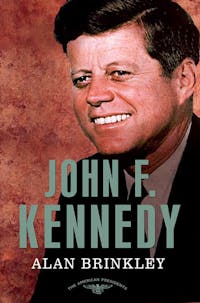John F. Kennedy
The American Presidents Series: The 35th President, 1961-1963
 Download image
Download image
ISBN10: 0805083499
ISBN13: 9780805083491
Hardcover
224 Pages
$34.00
CA$46.00
John Fitzgerald Kennedy was a new kind of president. He redefined how Americans came to see the nation's chief executive. He was forty-three when he was inaugurated in 1961—the youngest man ever elected to the office—and he personified what he called the "New Frontier" as the United States entered the 1960s.
But as Alan Brinkley shows in this incisive and lively assessment, the reality of Kennedy's achievements was much more complex than the legend. His brief presidency encountered significant failures—among them the Bay of Pigs fiasco, which cast its shadow on nearly every national-security decision that followed. But Kennedy also had successes, among them the Cuban Missile Crisis and his belated but powerful stand against segregation.
Kennedy seemed to live on a knife's edge, moving from one crisis to another—Cuba, Laos, Berlin, Vietnam, Mississippi, Georgia, and Alabama. His controversial public life mirrored his hidden private life. He took risks that would seem reckless and even foolhardy when they emerged from secrecy years later.
Kennedy's life, and his violent and sudden death, reshaped our view of the presidency. Brinkley gives us a full picture of the man, his times, and his enduring legacy.
Reviews
Praise for John F. Kennedy
"The admirable American Presidents series nears its end with another slim but astute biography by another big-league historian, this time Brinkley. The reputations of his predecessor (Eisenhower) and successor (Lyndon Johnson) are rising steadily; not so with John F. Kennedy, whose middle-of-the-pack rating has changed little. This seems a fair evaluation of his actual accomplishments, admits Brinkley, who adds that he left an enormous legacy as a charismatic leader and a glamorous symbol of hope and purpose long after his death. He was the handsome, unscholarly, self-indulgent son of Joseph Kennedy, whose enormous wealth and ambition cleared his path through Massachusetts and then national politics. As a congressman and senator, Kennedy may have been more conservative than Eisenhower—more fiercely anti-Soviet, in favor of military spending, uninterested in domestic reform and civil rights and an admirer of Joseph McCarthy. Elected our youngest president in 1960 by a tiny margin, his charm enchanted the nation despite a first year that included the disastrous Bay of Pigs invasion and bungled Vienna summit. Experience and input from advisors, including his brother, Robert Kennedy, improved his performance and social conscience, but Congress rejected his bills advancing civil rights, tax reform, aid to education, medical care for the elderly and antipoverty efforts. All passed under Lyndon Johnson, who possessed political skills that Kennedy lacked. Plenty of long, definitive works exist, but Brinkley takes his job seriously, filling 160 pages with a thoughtful, opinionated biography."—Kirkus Review
"Outstanding for clarity even by the standards of the excellent American Presidents series, Brinkley's overview of the thirty-fifth chief executive vaults to the head of the pack of basic biographies of its subject because of its thoroughness and evenhandedness. It notes all the most meaningful events and persons in Kennedy's life and all his most salient characteristics, including his lifelong ill health and obsessive womanizing, both of which Robert Dallek soft-pedals in his John F. Kennedy. Moreover, it states conflicting opinions of Kennedy and his actions throughout, though especially in the piquantly titled last chapter, "The Afterlife of John F. Kennedy." Brinkley's own evaluation, implicit rather than open, is admirably middle of the road. JFK was not the liberal hero ardent admirers made of him after his death, nor was he the incompetent detractors make him out to have been. Painfully slow to embrace black civil rights and guilty of embroiling the U.S. in Vietnam, he successfully resolved the Cuban missile crisis of 1962 and initiated real action on nuclear-arms limitation—no mean feats."—Ray Olson, Booklist
"Pulitzer Prize winner Brinkley adds his bit to the American Presidents series, edited by Arthur M. Schlesinger and Sean Wilentz, with this focused biography of John F. Kennedy. Especially valuable if you are collecting the series or have students needing something concise."—Library Journal
"Brinkley is a Columbia University professor of history and National Book Award winner for Voices of Protest: Huey Long, Father Coughlin, and the Great Depression. In this latest addition to the American Presidents series, Brinkley's concise biography of the iconic John F. Kennedy offers judicious opinions of the 35th president's overall legacy. Brinkley doesn't shy from Kennedy's well-documented flaws, noting euphemistically that even after becoming a U.S. senator in 1952 he was "slow to grow up." Brinkley focuses on the highlights of his subject's eventful presidency, giving the basics of the Bay of Pigs fiasco, the Cuban Missile Crisis, Kennedy's early role in Vietnam policy, and the civil rights movement. Regarding the latter, Kennedy's journey from holding a politically expedient view to a commitment to "the political and moral necessity of the end of segregation" is central. Brinkley treats Kennedy's assassination matter-of-factly, commenting that the bottomless conspiracy controversy is evidence of Kennedy's sustained power over the national imagination. In Brinkley's final analysis Kennedy's successes were modest and his legacy based on his embodiment of the unfulfilled promise of an America that, in retrospect, seems to many to have been a time of "national confidence and purpose."—Publishers Weekly
Reviews from Goodreads
BOOK EXCERPTS
Read an Excerpt
1
The Irish Prince
John Fitzgerald Kennedy was born into an Irish American world that his family helped change forever. For generations, Americans of Irish descent had faced almost insuperable boundaries to their aspirations....




